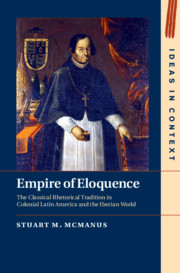 Empire of Eloquence
Empire of Eloquence Book contents
- Empire of Eloquence
- Ideas in Context
- Empire of Eloquence
- Copyright page
- Dedication
- Contents
- Figures
- Acknowledgments
- Abbreviations
- Introduction
- Chapter 1 The Foundations of the Empire of Eloquence
- Chapter 2 Philip IV’s Global Empire of Eloquence
- Chapter 3 A Japanese Cicero Redivivus
- Chapter 4 Indo-Humanist Eloquence
- Chapter 5 Centers, Peripheries and Identities in the Empire of Eloquence
- Chapter 6 The Republic of Eloquence
- Bibliography
- Index
Chapter 4 - Indo-Humanist Eloquence
Published online by Cambridge University Press: 09 April 2021
- Empire of Eloquence
- Ideas in Context
- Empire of Eloquence
- Copyright page
- Dedication
- Contents
- Figures
- Acknowledgments
- Abbreviations
- Introduction
- Chapter 1 The Foundations of the Empire of Eloquence
- Chapter 2 Philip IV’s Global Empire of Eloquence
- Chapter 3 A Japanese Cicero Redivivus
- Chapter 4 Indo-Humanist Eloquence
- Chapter 5 Centers, Peripheries and Identities in the Empire of Eloquence
- Chapter 6 The Republic of Eloquence
- Bibliography
- Index
Summary
Chapter 4 addresses the role of the classical rhetorical tradition in bolstering Iberianized Catholicism among native converts in Paraguay and Portuguese India. By taking a connected and comparative approach to the application of the classical rhetorical tradition by Jesuit missionaries and its reception by native audiences both in the Americas and in coastal western India, this chapter argues that classical rhetoric shaped Konkani-language missionary oratory much more than Nahuatl, Quechua and Guarani examples, and offers a possible explanation based on the social and caste structures of the two contexts. In so doing, this chapter places Latin American ethnohistory in a new meta-geographical context, and argues for the important constitutive role played by non-European languages, peoples and cultural practices in the Iberian World.
- Type
- Chapter
- Information
- Empire of EloquenceThe Classical Rhetorical Tradition in Colonial Latin America and the Iberian World, pp. 155 - 189Publisher: Cambridge University PressPrint publication year: 2021
